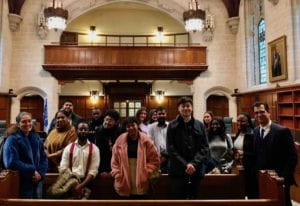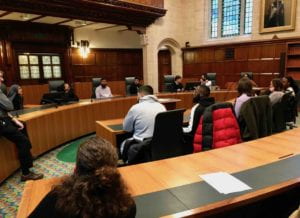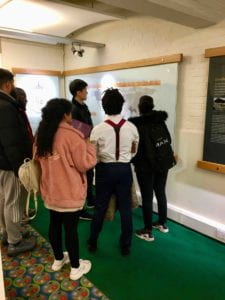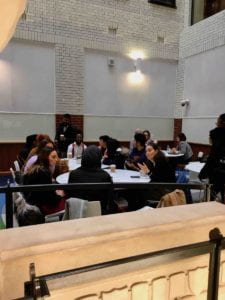
Goldsmiths LLB Law students and academics at the UK Supreme Court (November 2019)
Goldsmiths students doing Public Law and the Human Rights Act in Year 1 of the LLB Law programme witnessed law being made at the highest level (and having potentially pervasive effect) during their recent visit to the UK Supreme Court.
In a busy day for the supreme jurisdiction in the country, the court first found that five asylum seekers that were detained pending their removal from the UK had been detained unlawfully and were therefore entitled to compensation under domestic law for any loss that the wrongful detention had caused them. ‘Thousands of asylum seekers could bring claims for millions of pounds of compensation’ after the Supreme Court judgment, wrote The Times (the Brief) the following day.
In a second judgment, the Court pronounced that a Royal Mail whistleblower had been unfairly dismissed, for raising concerns over alleged regulatory breaches.
Lord Kitchin, Lord Wilson and Lady Hale (President) delivered the judgments in these two cases.

Were the appellants right to refuse to fulfil Mr Lee’s order? How would you have applied the law if you were on the bench for this case?
The students then took part in an interactive workshop delivered by a member of staff at the Supreme Court, introducing them to key public law and human rights cases, asking them how they would have voted on them. R v Gnango, the leading authority on joint enterprise and transferred malice, and Lee v Ashers Baking company (the ‘gay cake’ case) were a focal point of discussion.
The group then moved to Courtroom 3, to observe Privy Council proceedings, in a case that was on appeal from the Court of Appeal (Bahamas). The appellant had been convicted of rape and sentenced to 14 years’ imprisonment in 1996, and his appeal raised the issue of whether the criminal proceedings had been vitiated by a procedural error at the committal stage and whether the defendant had been defined a fair trial because DNA samples had not been provided to the defence. Lord Carnwath, Lord Hodge, Lady Black, Lord Lloyd-Jones and Lady Arden were in the judicial bench.

Learning about the Privy Council’s role as the court of final appeal for UK overseas territories, Crown dependencies and (some) Commonwealth countries.
The wonderful visit ended with the students spending some time at the permanent exhibition on the lower ground floor of the building and enjoying some cake, coffee and tea, at the Court’s café, in a well lit atrium that marries modern architectural elements with the neo-gothic building of the Court which started life as the Middlesex Guildhall in 1913.
The visit was part of the Public Law and the Human Rights Act curriculum, and is typical of the innovative approach taken at Goldsmiths to incorporate experiential learning activities and study visits as part of contact time in all modules in the LLB degree.
The visit was coordinated by the module convenor, Dr Virginie Barral.

Students and academic staff reflecting on the visit, and catching up with each other, over a cup of coffee.